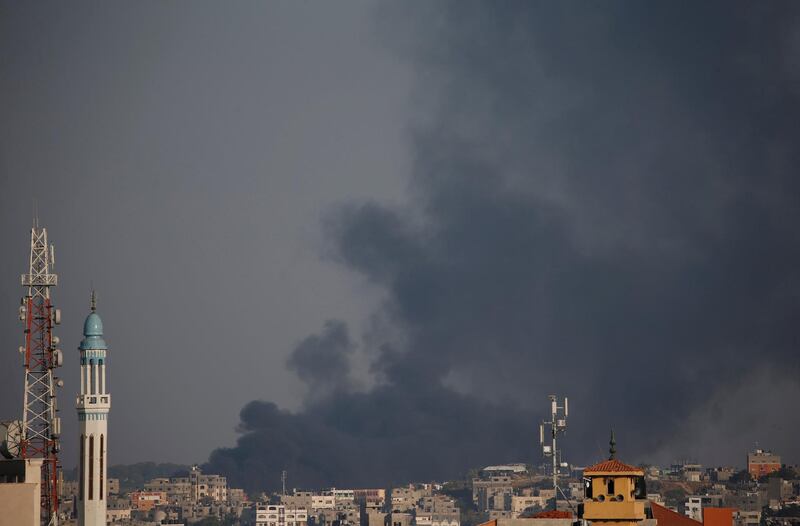As the threat of all-out war in Gaza rises, there are signs of a renewed appetite between Hamas and Israel for a period of calm that would prevent the coastal enclave’s fourth conflict in just under a decade.
With images of at least 116 Palestinian protesters shot dead by Israeli forces along the Gaza border fence still fresh in the memory, and cross-border activity by both Israel and Palestinian factions ramping up, back-channels have been reopened between the foes in a bid for a new ceasefire or hudna in the enclave.
Hamas's number three leader in Gaza, Khalil Haya, confirmed Sunday that there are active contacts under way about a ceasefire, terming them a "political mobilisation" as quoted by Emirati newspaper Al Itihad.
Israeli media reports have identified Egypt and Qatar as the two main interlocutors through which Gaza's rulers Hamas are conveying indirect messages to Israel over the terms of any truce. The United States has also been involved amid indications that Israel and Hamas appear to be more open to avoiding an escalation of violence and more amenable to terms that they would have never previously agreed to.
For Israel, it may allow Hamas to remain armed in return for an end to rocket fire and tunnel digging. For Hamas, its hardline leader in Gaza, Yahya Sinwar, has expressed support for a "popular nonviolent struggle", a new position that may allow for fresh construction projects.
"Hamas is interested in a ceasefire for something in return, a significant easing of the siege," Mkhaimar Abusada, a political scientist at al-Azhar University in Gaza, explained. "From a religious perspective it views it as acceptable to reach a long term truce with Israel but without recognizing Israel."
Any agreement would not be an explicit political settlement between Hamas and Israel, Mr Abusada added, but "more of an interim ceasefire" that would allow Hamas to survive dire current economic and social conditions in Gaza and give Israel an escape from international and regional pressure because of the humanitarian crisis there.
A new proposal by Kobi Michael, former deputy director general for the Israeli Ministry of Strategic Affairs, chimes with a growing sentiment in Israel's security establishment that the government needs to re-evaluate its policy towards Hamas and reach at least a temporary common working understanding that could improve the situation in the territory.
"We are not talking about a peace treaty, we are talking about a long term arrangement with Hamas that will enable complete quiet on the border," Mr Michael, an analyst at the Institute for National Security Studies in Tel Aviv, told The National.
But if the humanitarian and economic crisis continues unabated, Hamas could conclude there is no other path than a new round of violence, Mr Michael added. Worse, groups with a more extreme agenda could emerge.
The group is arguably at its weakest for years, threatened internally by an inability to help Gaza's residents and the presence of opposed extremists. Externally, Israel has tightened its blockade and the Palestinian Authority in the West Bank has taken crippling fuel and tax measures against its rival movement after repeated failures to reconcile.
So it would be an incentive for Hamas to agree to such a truce, as a ceasefire would boost its legitimacy in the Arab world and internationally, he added.
_____________
Read more
Israeli navy seizes Palestinian protest boats
Israeli strikes hit Gaza Strip after mortar fire, Hamas says
_____________
Regionally, Hamas is being pressed into such a ceasefire agreement with Israel, specifically by Egypt, which fears a Hamas approach to Israel or the US that would sideline them from any diplomatic solution.
"Cairo authorities are involved in these discussions as the mediators for historic reasons, but also because they cannot afford to let a direct arrangement lessen Egypt's role as the key broker in whatever is left of what we call negotiations between Israelis and Palestinians," said Amin El Mahdy, an Alexandria-based historian.
Overtures to Tel Aviv and Washington have become more likely because "the Egyptian security apparatus has little to offer Gaza other than opening the crossing at Rafah," he added.
Israel must also make a radical change in how it views Hamas, according to Mr Michael's proposal. No longer should it push for the more moderate PA, headed by Mahmoud Abbas, to replace Hamas in Gaza. Hamas routed rival Palestinian faction Fatah in a brief civil war more than a decade ago, gaining control over the enclave from the PA.
Instead, it should drop that goal and "recognize Hamas as the sovereign actor in Gaza and allow it to rule in civil terms," he said. International aid should not be channelled through the PA but rather should go through Hamas. "Gaza has to be handled as a separate entity and this entity is run by Hamas. You have to reach the arrangements with Hamas," he concluded.
Regardless, any talks over an enduring period of calm may be short-lived as tit-for-tat military action continued on Tuesday. Israeli jets bombed Gaza hours after militants from the territory fired more than 25 mortar shells toward communities in southern Israel.
The barrage appeared to be the largest single flurry since the 2014 Israel-Hamas war. Smaller Gaza movement Islamic Jihad claimed responsibility, but appeared to have received approval from Hamas.
Neither side publicly pointed to a de-escalation. Ismail Radwan, a Hamas official, said the barrage proved that the "resistance is capable of hurting the occupation".
Israeli Prime Minister Benjamin Netanyahu was just as threatening in his response.
"Israel will exact a heavy price from those who seek to harm it," he warned.





